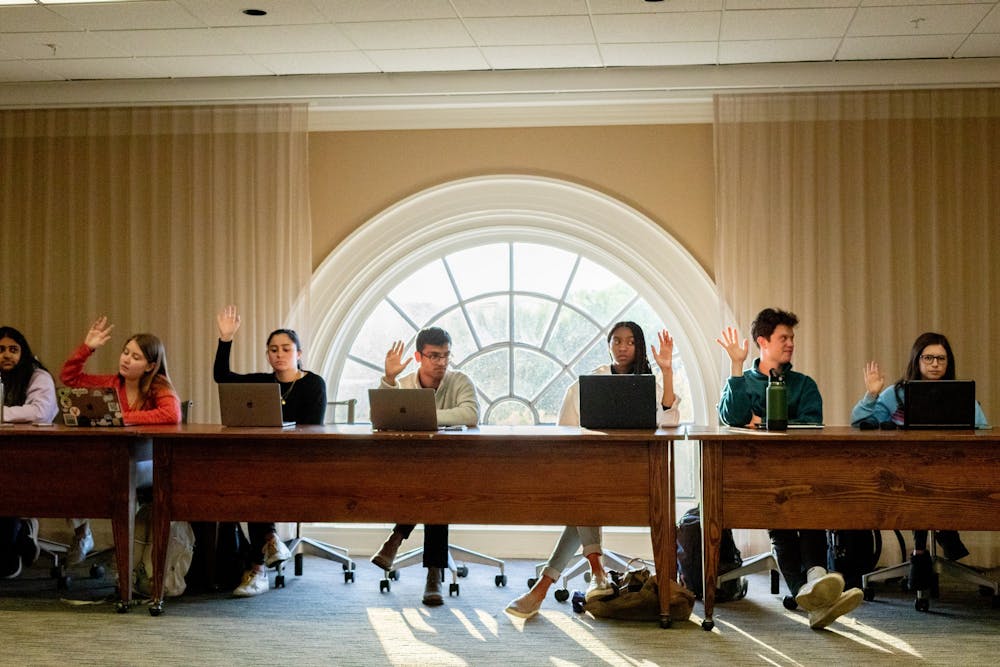The Honor Committee approved a new set of bylaws in a 16 to one vote during a virtual meeting Sunday evening. These amendments will act as the foundation for the Committee’s new multi-sanction system and are designed at increasing case processing efficiency.
Under the new system, a Panel for Sanction will determine sanctions based on the individual contexts and circumstances of each student. Three-fourths of the panel — composed of seven randomly selected students and five randomly selected Committee members — would have to agree on parameters of evidence and intention to find a student guilty of an Honor offense. If five-sevenths of the panel are in agreement, they may remove expulsion as a possible sanction.
The newly approved bylaws also include a provision to delay the start of the Honor investigation until the student decides whether or not they will complete an Informed Retraction — an option allowing a student to admit guilt before entering trial. This change will streamline Honor’s process by reserving investigative efforts only for cases which require them, according to Tim Dodson, co-chair of the Committee’s Policies and Procedures subcommittee and graduate Architecture student.
Dodson and co-chair third-year College student Kellen Narke workshopped the amendments with the P&P Committee then presented them for comment during Committee meetings. While the bylaws have formally been passed, they will likely continue to evolve as the Committee formally implements the multi-sanction system, Dodson said.
“Bylaws are, in some ways, an evolving document,” Dodson said. “It's possible that we find that there's unintended consequences, or there's challenges that arise that we didn't anticipate, and so we might be in the process of crafting additional bylaws or amendments throughout the term ahead.”
This past March, University students voted to pass a referendum outlining a multi-sanction system — the first of its kind in the Committee’s history. Prior to last year’s referendum, which reduced the single sanction of expulsion to a two-semester leave of absence, expulsion served as the only sanction for students found guilty of Honor violations.
Prior to approving the bylaws during Sunday’s meeting, Committee members passed two small amendments to the bylaws. The bylaws have been a work in progress over the past few months and the Committee has been consistently working to make amendments. One amendment was revised to explicitly guarantee hearings for all students even when admitting guilt.
Another amendment considered the range of sanctions available to the Panel for Sanction when a student admits guilt without a formal hearing. While the drafted bylaw eliminated any “permanent sanctions” in such cases, the revised bylaw clarifies that only expulsion will be removed from consideration — leaving the possibility of sanctions such as permanent transcript notation.
Once the multi-sanction system is formally ratified Saturday, the Committee will begin processing cases under the new set of bylaws. Students who were reported for Honor violations since the multi-sanction system passed were given the option to delay their case to have it processed under the new bylaws.
Hamza Aziz, Honor Committee Chair and rising fourth-year College student, said while the Committee will continue to workshop the policies and procedures of the new system, its attention will shift to putting the system into action. He also mentioned the possibility of publishing an editorial to educate students about the new bylaws.
“The two focuses now I would identify as an effective implementation of the multi-sanction system and then, equally as important, community outreach and education about the new system,” Aziz said. “[We need to be] making sure [students] understand what the bylaws are saying, and how the constitution that was voted on in March has been realized.”
The Committee will hold its next meeting via zoom July 9 — the meeting link will be available on their website’s homepage.







